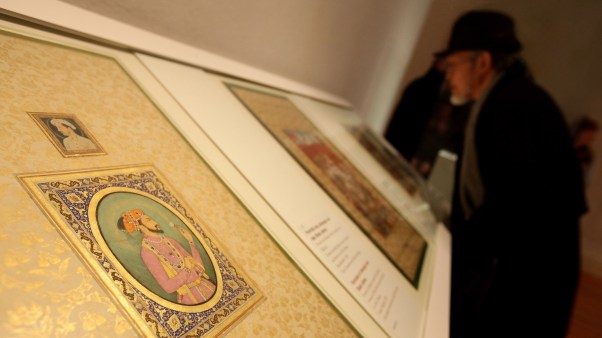A plan by the Russian government to give every citizen a tax identification number has alarmed many Orthodox Christians who fear that the numbers, along with bar codes, are hostile to the Christian faith. Discussions about the possible introduction of social security cards with bar codes have added to the growing concern here. All bar codes developed according to the international UPS standard include three pairs of parallel lines which critics suggest could represent the number 666. According to the Book of Revelation in the New Testament, 666 is the “number of the beast” (Revelation 13:18). The “beast” is also widely seen as the “Antichrist,” whose coming is predicted in the New Testament, along with a series of disasters and the death of Christian believers. Although many computer experts reject suggestions that the parallel lines represent 666 or the Antichrist, many Russian Orthodox Christians are deeply afraid of the bar codes. They are also worried that tax numbers allocated to all citizens would replace their baptismal names. Application forms are being handed out to citizens across Russia. The forms must be completed to obtain a tax number. Some priests have refused communion to church members who have completed the application forms, which also have a bar code printed on them. Last month, the Russian Orthodox Church’s synod took the unusual step of issuing a public statement to calm fears. The statement called on the government to reconsider the plans for the tax numbers.”Many Christians who consider that the name given to them in baptism is sacred, consider it unworthy to ask the government for some new ‘name’ in the form of a number,” the statement said. It then urged church members not to read too much into the numbers. The statement told clergy and church members to remain calm and remember that “no external sign will violate the spiritual health of a person, if it is not the result of a conscious betrayal of Christ.”The statement criticized priests who refused communion to those who had filled in the forms.But the statement also called on the government to set up another system for keeping records of citizens so that those who were wary of electronic cards would still be able to receive benefits. Vsevolod Chaplin, a high-ranking official of the church’s Moscow Patriarchate, told Ecumenical News International (ENI) that several parishes had decided that employees would not apply for the tax numbers because of the bar codes on the application forms.If the government had allocated tax numbers without the need to complete an application form, Chaplin said, this would “already take part of the moral burden away from those Christians who are concerned with the problem.”The Russian tax ministry said last month that it had no plans to issue cards with bar codes linked to the tax numbers. People would receive “certificates” with the numbers, which would have to be entered into computers, the ministry said.Russian Christians are not the first to fear bar codes. Some ultra-conservative groups in Western countries have claimed that there is a link between 666 and bar codes. In Greece in 1997, the introduction of European Union passports with bar codes provoked public rallies and an appeal by the Greek Orthodox Church which asked the government in Athens not to ratify the Schengen agreement, under which the passports were to be introduced. The Greek parliament later ratified the Schengen agreement by a narrow majority.One of the leading Russian campaigners against the bar codes is a conservative priest and leading publisher, Archimandrite Tikhon Shevkunov, who heads the Sretensky Monastery in central Moscow. When the monastery launched its own web site, a special page, called Schengen Zone, was dedicated to the problem of the “devil in the bar codes.”However, it is unclear how many Russians are concerned about bar codes and computerized identification numbers. The synod’s statement puzzled some Orthodox Christians.Sergei Chapnin, the editor of Sobornost, an Orthodox Internet magazine, said he was surprised by the synod’s statement because it gave undue prominence to the issue without a proper theological discussion. He acknowledged, however, that there was a problem, which he said was a sign of an “occult” mentality penetrating the Orthodox Church. “To believe in the magic of numbers is absolutely a non-Christian attitude toward life,” Chapnin said. “If some people are afraid of it, it only means that occultism is intruding into Christian consciousness, and especially the consciousness of new believers who make up the majority in today’s Russian Orthodox Church.”Copyright © 2000 Ecumenical News International. Used with permission.
Related Elsewhere
The Sretensky Monastery‘s Schengen Zone won’t be of much interest unless you speak Russian.Sadly, Sobornost is also a Russian-only Web site.Paul D. Steeves’s News About Religion in Russia site has been keeping a close watch on this story. See his latest here and here. The Moscow Times has more on the controversy.Concern over bar codes as sign of the Antichrist isn’t limited to Russia. On his Web site, Jay James warns, “The mark of the beast may not be a tattoo or implanted chip at all, but it may represent a symbolic rejection of one’s faith to God. But, the technology of implanted chips, bar codes and scanners can easily be seen as a tool for one such person as a antichrist or a government individual who is drunk with power, could easily mark and monitor it’s citizens buying habits and movements in todays world.” Likewise, in PropheZine, John L. Terry bemoans, “The UPC symbol is a series of bar codes which allow for computer identification of goods. Inventory, pricing, and tracking of goods by computer is now a reality. Eventually, no product produced in the world will be able to be bought or sold without this identifying mark.”
Copyright © 2000 Christianity Today. Click for reprint information.








